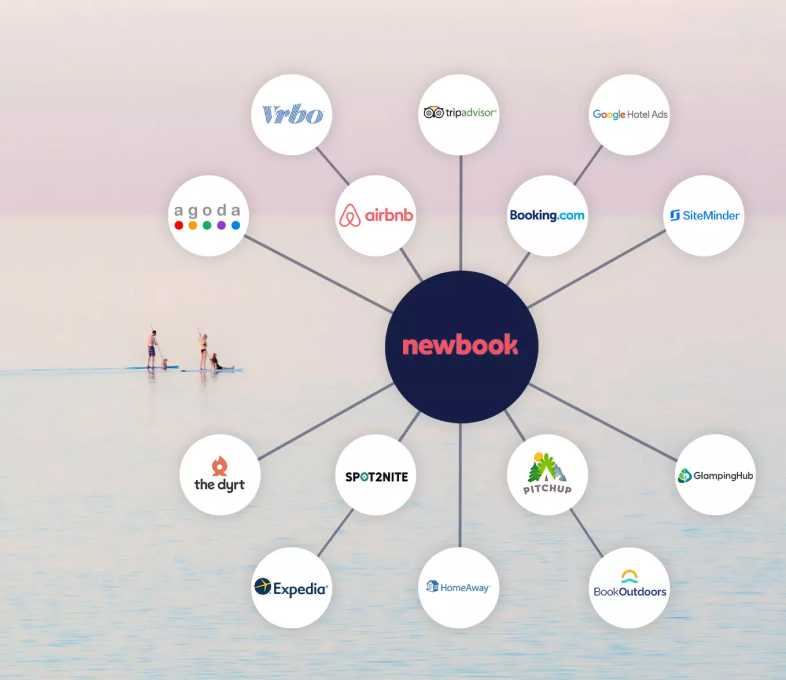Sections
- Introduction
- What Is Reservation Software?
- Choosing the Right Campground Software & Reservation System for Your Property Type
- Must-Have Features in Modern Reservation Platforms
- Free vs Paid Reservation System: What’s the Real Cost?
- Campground and RV Park Marketing and Advertising to Attract Guests
- Attracting Guests with Campsite Amenities, Not Just Location
- Scaling with a Central Reservation System
- What to Look for in a Reservation Software Partner
- Switching from Your Current Campground Software Without the Pain
- Final Checklist: Is Your Property Set Up for Success?
- Conclusion
The campground industry may still be rooted in nature, but the tools that keep it running have gone digital. From booking to check-out, modern campers expect the same level of convenience they get from hotels and vacation rentals. They want instant confirmations, mobile access, and personalized communication. For campground and RV park operators, this shift means moving beyond old-school calendars, spreadsheets, and handdrawn site maps.
Although assigning sites to guests is a fundamental part of campground management, there’s much more to it than that. Campground management software includes managing online bookings, syncing with Online Travel Agencies (OTAs), handling check-ins, offering upsells, and creating guest experiences that lead to five-star reviews. Whether you operate a small, family-run park or oversee multiple properties, the right reservation software can streamline operations, increase revenue, and reduce administrative stress.
This guide will walk you through what campground reservation systems can do, which features matter most, and how to choose a solution that fits the way your business works. Whether you offer tent sites, RV hookups, glamping units, or a combination of all three, there’s a smarter way to manage it all.
Let’s explore the tools that are helping campground operators work more efficiently and grow their businesses with confidence.
RV property management or campground management is a little more complex than color-coding a Google Calendar, especially these days with camping being more popular than ever. Some point to the social-distancing aspect of the pandemic as a reason why camping in North America saw a surge at the time, but camping continues to be a popular vacation option, even though the camping market overall has returned to a more stable state.
A noteworthy stat is that as much as 61% of total revenue in the camping market is projected to be generated through online sales by 2029. This is important to note for campground and RV park owners because, without a strong online presence (namely, a booking and reservation system that holds its own), you’ll surely be missing out on guests. The reservation system works behind the scenes to capture these online bookings (as well as ones over the phone or email) and is a key piece of software for building a successful campground. Plus, having a robust online presence is a great way to incorporate your campground advertising ideas to attract even more guests.
Why This Matters Even for Small Parks
Even small, independently run campgrounds or RV parks aren’t immune to this shift to more online sales. In fact, they may stand to benefit the most from implementing a proper reservation system. Here’s why:
- Online Bookings = Full Sites: Manual booking processes (email, phone calls, or a clunky contact form) create friction for guests, and that friction means lost bookings. A good reservation platform turns your website into a 24/7 booking engine, letting guests choose their site, pay online, and get confirmation instantly. For a small park, even filling two or three extra sites per week can translate to thousands of dollars annually.
- Fewer Mistakes, Less Stress: Double bookings, missed voicemails, and unread emails are common pitfalls of paper logbooks or simple calendar tools. A reservation system removes guesswork with real-time site tracking, automated guest messaging, and smart conflict prevention.
- Automate the Admin: For many small operators, the biggest cost isn’t payroll, it’s time. Campground software automates repetitive tasks like sending confirmations, assigning gate codes, or logging payments. That means less time doing paperwork and more time focusing on what makes your park special, whether that’s guest hospitality or a well-maintained trail network.
- Compete With the Big Guys: Larger campgrounds and chains already use modern management software that allows for dynamic pricing, upsells, loyalty programs, and OTA integrations. With a platform like Newbook, small parks can access the same enterprise-grade tools without needing an enterprise-sized team.
- Insight-Driven Growth: Even smaller campgrounds benefit from the reporting and analytics baked into reservation software. You’ll know your most popular sites, busiest weekends, average booking value, and occupancy rates, all of which help you make smarter decisions about pricing, marketing, and staffing.
- It’s What Today’s Guests Expect: Guests no longer tolerate multi-day response times or “call for availability” messages. They want what they’re used to: instant, online, mobile-friendly access to booking and communication. And if your campground can’t provide it, the one down the road probably can.
Core Functions of Campground Reservation Software
At its core, reservation software is designed to replace your patchwork of sticky notes, spreadsheets, and crossed fingers with one powerful, central hub for reservations, revenue management, channel management, and more.
Reservation Management
Accept and manage bookings from every channel—direct website bookings, phone calls, walk-ins, and OTAs. Real-time availability updates ensure you never double-book site #42 again.
- View, edit, or cancel reservations with a few clicks
- Handle individual, group, or event-based bookings (hello, motorcycle rally weekends!)
- Set stay rules for peak seasons, minimum nights, and site types
Interactive Site Map
With Newbook’s campground booking software, you can include an interactive map that appears during the booking process. This allows the guest to visualize your park layout and even filter to sites suitable for tenting or that will fit their RV.
- Color-coded availability at a glance
- Easily move bookings around for site optimization
- Toggle views for RV, tent, cabin, or group sites
So you manage a campground? We make it easy
Newbook is your all in one campground management software. Talk to us today to learn how you can improve operations and increase bookings for your campground.


Online Payments and Invoicing
Automate payment collection with secure credit card processing through Newbook. Generate invoices, charge deposits, and issue refunds—all without a single phone call.
- Schedule payments for long-term or monthly stays
- Offer multiple payment methods
- Automatically calculate taxes, fees, and discounts
Front Desk and Check-In/Out Management
Streamline check-in and check-out with digital tools that free your staff from paperwork and long lines at reception.
- Enable contactless check-in via SMS or self-service kiosk
- Assign gate codes or key pickup with systems like Key Café
- Real-time guest profiles with reservation history, payments, and notes
Channel Management
Ditch the manual double-entry and sync your availability, rates, and bookings across all OTAs. A channel manager ensures your listings are always accurate, everywhere.
- Automatically update availability across all OTAs you list with
- Centralize rate changes in one place
- Reduce overbookings and boost visibility to drive more reservations
Reporting and Analytics
Get instant visibility into what’s working and what’s not. Track revenue, occupancy, booking trends, and marketing performance all from your dashboard.
- Daily, weekly, and monthly reporting
- Occupancy forecasting and rate comparison tools (dynamic pricing)
- Filter data by location, site type, or booking channel
Integrations and Syncing
Connect with third-party software to create a seamless tech ecosystem that works the way you do.
- Integrate with accounting platforms
- Sync rates and availability across OTA channels
- Connect to smart metering, POS, or license plate recognition tools
Staff Roles and Permissions
Manage who can do what within your system. Perfect for large teams across multiple properties.
- Role-based access control
- Track user activity for accountability
- Create custom workflows for front desk, housekeeping, and maintenance teams
Campground Software vs. RV Park Software vs. Lodge Management Systems
Not all campground software is built the same. Whether you’re starting a campground or looking to build an RV park, you’ll need to pick a software option that fits your business goals and objectives, and the subtle nuances of these different software types could make a big difference in the effectiveness of meeting them.
Let’s break down the difference between three popular types:
| Software Type | Best For | Common Features | Unique Capabilities |
| Campground Reservation Software | Tent sites, group camping, rustic facilities | Site maps, group booking, seasonal rates | Often includes firewood/amenity sales, activity tracking, and more |
| RV Park Software | RV parks with hookups, metered utilities | Long-term stays, utility billing, vehicle tracking | Power meter integrations, license plate recognition |
| Lodge Management Systems | Cabins, lodges, glamping resorts | Room types, housekeeping schedules, Point of Sale (POS) integration | Less focused on outdoor amenities, more on traditional hospitality |
Overlapping capabilities might not be a bad thing either. For instance, you might run a park that offers campsites, cabins, and spaces to park RVs, so your management software better be ready to handle everything from 50-amp hookups to deluxe yurts. (Spoiler alert: Newbook can.)
Beyond Reservations: What the Best Campground Software Should Really Do
Sure, booking a site is important. But the real power lies in the extras that the best campsite software options can provide. Here’s how Newbook’s reservation system helps campground and RV park managers go beyond the basics:
-
CRM: Know Your Campers
A Customer Relationship Management (CRM) isn’t just a tool, it’s your digital memory. With Newbook, every guest interaction becomes part of a personalized profile. From preferred sites and past purchases to stay history and even special requests (“prefers shady sites near washrooms”), you can offer a personalized guest experience.
CRM functionality allows you to segment guests by behavior, loyalty level, or site preference and then trigger communications or offers that match. Want to reward your most frequent RVers with early access to holiday weekends? Want to nudge past guests with an exclusive returning camper discount? With a built-in CRM, that kind of smart engagement becomes automatic.
Personalized marketing drives repeat bookings, and repeat guests spend more and leave better reviews.
eBook: Meet Your Campers of the Future
Showcasing the top 3 grow profiles to target and sharing insights on how to attract these keen campers regardless of budget or location.


-
Guest Communication: Instant, Automated, and Personal
Campers crave clarity, especially when navigating late check-ins, gated entries, or unfamiliar facilities. Newbook’s communication tools automate your RV park or campground guest communications flow with SMS and email triggers that can be personalized and scheduled.
Before arrival, guests can receive gate codes, driving directions, and weather advisories. During their stay, you can notify them of activity reminders, onsite promotions, or a fresh firewood delivery. After checkout, a “thank you” message or review request keeps the conversation going.
These messages can be set up once and triggered by guest actions, so you can create a high-touch experience without requiring a lot of extra effort from your staff. Proactive, consistent communication also reduces front desk stress, improves guest satisfaction, and builds trust with new campers.
-
Upselling: Make That Booking Basket Bigger
Think of your reservation system as your most persuasive salesperson: always on, always suggesting. With Newbook, you can add upsell opportunities directly into the booking path, encouraging guests to enhance their stay with premium add-ons like:
- Early check-in or late check-out
- Campsite items like Firewood bundles, s’mores kits, or picnic packs
- Golf cart or kayak rentals
- VIP site upgrades (lakefront, shade, extra space)
You can even tie upsells to specific site types or guest profiles, offering pet packages to guests traveling with furry friends, or bundling activity passes for families.
Strategic upselling can increase revenue per booking by 10–30% without any pressure or awkward sales pitch.
-
Marketing: From Booking Engine to Growth Machine
A great campground or RV park management platform should double as a marketing hub. Newbook integrates reservation data with your marketing tools to fuel automated campaigns that are smarter and more effective.Whether you’re sending seasonal promotions, retargeting OTA guests for direct bookings, or running a campaign to reattract former guests, Newbook’s system allows you to:
- Segment by stay history, spend, or amenity preference
- Trigger automated emails and SMS campaigns based on guest behavior
- Sync availability and rates with OTA listings for full-channel alignment
- Track campaign performance to see what actually drives conversions
After setup, you can even connect with third-party marketing platforms like Mailchimp or use Newbook’s built-in tools to keep your pipeline full without lifting a finger. Marketing automation reduces cost per acquisition and builds a pipeline of high-converting, repeat guests.
In outdoor hospitality, one-size-fits-all software rarely fits well. The operational needs of a tech-forward glamping retreat are going to differ wildly from those of a luxury glamping resort or a multi-property lodge portfolio. That’s why choosing the right reservation system is more about aligning your technology with the way your property actually functions rather than checking off a generic feature list.
From utility billing to activity scheduling to experience-driven upsells, your reservation software should reflect the rhythm of your business, not force it into a mold. Here’s how to evaluate camp software options based on your property type and what to look for beyond the buzzwords.
RV Parks and Campgrounds
Think: Operational efficiency meets outdoor unpredictability.

Your goal: Stay efficient, flexible, and guest-ready—especially when things don’t go to plan.
RV parks and campgrounds are operationally unique. You’re not just selling beds, you’re managing powered sites, sewer hookups, transient guests, weekend event surges, and the occasional walk-in who didn’t check the weather. And during a long weekend, your front office can go from quiet to chaos in minutes.
The best campground system for your business won’t flinch under pressure.
Key capabilities to look for:
- Visual site mapping with real-time drag-and-drop booking adjustments, ideal for reassigning guests quickly or grouping large party reservations
- Multi-channel booking support (direct, walk-in, OTA) with instant syncing to prevent overbookings
- Metered utility tracking for accurate billing at check-out—no more clipboards or estimating kWh usage
- Seasonal rate structures and promo scheduling that adapt to peak demand, special events, or shoulder season discounts
- Late check-in tools, such as automated SMS gate codes and Key Café integrations, to keep after-hours arrivals running smoothly
If your campground software can’t handle a site swap and a group check-in during a thunderstorm, it’s not built for campground life.
Vacation Rentals and Glamping Resorts
Your goal: Deliver a premium, frictionless guest experience from first click to final checkout.

Running a Glamping resort or vacation rental is just about providing a better shelter in the woods compared to a standard camping tent, it’s about the experience. Whether it’s a treehouse with an outdoor tub or a luxury safari tent with concierge firewood delivery, your guests expect boutique-level personalization and seamless automation.
That means your campground software must do more than take bookings—it should act like an invisible assistant, anticipating guest needs and reducing your operational overhead.
Look for systems that offer:
- Customizable stay rules, including availability gaps, minimum-night stays, and cleaning buffer windows
- Automated pre- and post-stay communications with personalized touches (Wi-Fi codes, local tips, check-in instructions)
- Dynamic upselling tools at checkout—think s’mores kits, bike rentals, or welcome hampers
- Channel manager integrations with real-time syncing across Airbnb, Vrbo, Booking.com, and your own website
- Calendar and housekeeping sync, so your team always knows what’s coming in, going out, and needs a reset
Glamping guests are paying for the wow-factor. If your system can’t deliver curated, high-touch experiences at scale, you’ll fall short of expectations, which will reflect in your reviews.
Hotels and Lodges
Your goal: Achieve operational consistency while giving each property room to thrive.
 Managing a single boutique lodge is one thing. Managing five across different regions, each with its own housekeeping team, revenue goals, and amenities, is another. You need centralized visibility without micromanaging every front desk or reservationist.
Managing a single boutique lodge is one thing. Managing five across different regions, each with its own housekeeping team, revenue goals, and amenities, is another. You need centralized visibility without micromanaging every front desk or reservationist.
The right system should give the head office full control of performance, branding, and data while empowering on-site teams to run day-to-day operations confidently.
Top features to prioritize:
- Multi-property dashboards that show live availability, revenue, and occupancy across all locations
- User permissions that allow regional GMs, housekeeping staff, and marketing teams to access exactly what they need—nothing more, nothing less
- Centralized rate and policy control, so brand consistency doesn’t depend on individual memory
- Cross-property guest profiles, allowing loyalty tracking, personalized service, and VIP recognition across your portfolio
- Advanced reporting and forecasting tools that help you plan promotions, staffing, and CapEx with data, not guesswork
If you’re managing multiple systems for each location, you’re not scaling—you’re surviving. Choose a solution that centralizes without compromising local execution.
Today’s adventure-seeking outdoor travelers expect a frictionless digital experience before they even pitch a tent or hook up their rig. So, if your reservation platform can’t keep up, it’s time for an upgrade.
Here’s what modern operators should demand from their reservation software (no carrier pigeons or fax machines required):
Online Bookings From Your Website
Remember that stat we mentioned earlier where a big chunk of the camping market’s revenue is generated online? The big takeaway is that guests should be able to book a site directly on your website without hassle. A seamless, branded booking engine keeps guests on your turf and your revenue in your pocket. Here’s what Newbook offers:
- Real-time availability
- Custom site types, add-ons, and upsells
- Mobile-first interface for guests booking from the road
- Customize interface colours and fonts so it doesn’t look different from your website (which could cause potential guests to bounce)
OTA Integration
You love direct bookings, but don’t ignore the billboard effect that OTAs provide. Modern platforms should sync with OTAs automatically so you don’t have to manually update every listing each time someone books a spot.
- One system to update rates and availability across all channels
- Avoid overbookings and eliminate the copy-paste chaos
- Drive more reservations, especially in shoulder seasons
Automation: Your New Best Staff Member
With automation, you can say goodbye to repetitive tasks. A good reservation platform automates everything from confirmation emails to post-stay reviews, saving your staff time and reducing the risk of errors.
- Automated booking confirmations and check-in instructions
- Scheduled payment reminders
- Post-stay survey emails or review nudges
Channel Management = No More Double Bookings
We understand that double bookings can be used as a strategy to ensure a full campground, but most owners want to avoid them due to the very real risk of upsetting guests. In any case, you want to retain complete control over the bookings that are coming in. A real channel manager is like an air traffic controller for your reservations. It keeps your OTA listings, direct bookings, and walk-ins all in perfect sync, so it’s easy to see what’s what.
- Prevent (or control) double bookings across all platforms
- Instantly update inventory when a site is booked or canceled
- Manage rate parity and blackout dates with ease
More bookings, more often with our built in channel manager
Newbook is your all in one property management software. Talk to us today to learn how you can inprove operations and increase bookings for your business.


Dynamic Pricing and Upsell Automation
Why leave money on the table? With dynamic pricing, your software can adjust nightly rates based on occupancy, season, or demand. Combine that software with a dynamic pricing strategy and automated upsells, and your average booking value will suddenly look way healthier.
- Offer extras like firewood, early check-in, or golf cart rentals during checkout
- Create promos or packages that drive higher conversions
- Adjust pricing automatically for holidays, weekends, or slow periods
Enterprise-Level Reporting for Multi-Park Operators
Running more than one property? Your reservation platform should give you 360-degree visibility across all locations, without requiring a data science degree.
- Cross-property reporting
- Revenue forecasting and performance benchmarks
- Centralized guest data for repeat stays and marketing
Self-Check-In and Mobile Guest Communication
Guests love convenience, and operators love saving time. With a single system, they can skip the front desk, get their gate code by text, and message you from the road.
- Self-service kiosks or mobile check-in
- SMS updates for site assignments, weather alerts, or “your firewood’s ready”
- Fewer lines, more satisfaction
Integration-Ready or Built Into a PMS
Modern reservation software shouldn’t operate in a silo. It should either be part of a full property management system or easily integrate with tools you already use, like accounting, POS, smart metering, or marketing platforms.
- Look for open API options for custom integrations
- Sync with PaidYET, IDeaS, Wild Energy, and more
- Scale your tech stack without rebuilding it from scratch
On the surface, free campground reservation software sounds like a dream. Who doesn’t love the word free? But when it comes to managing your campground, RV park, or glamping resort, that “zero-dollar” price tag can quickly become a cost center in disguise.
| Free Camground Reservation Software | Pros | Cons |
| Cost | $0 upfront—great for tight budgets | Hidden costs in time, lost bookings, and manual work |
| Customization | Open-source options may offer flexibility | Requires technical skills or developer support |
| Ease of Use | Simple tools for very small operations | Often clunky, outdated UX with minimal automation |
| Features | Basic reservation management | Limited or paywalled features like dynamic pricing, upsells, or CRM |
| Support | Community forums (if you’re lucky) | No live help, no onboarding, no troubleshooting safety net |
| Security | Rarely prioritized | Higher risk of breaches, outdated software, and no compliance guarantees |
| Scalability | OK for one tent site in the woods | Struggles with multi-park operations or enterprise needs |
The Pros of Free Reservation Systems
Low barrier to entry
Free campground reservation software is undeniably appealing, especially if you’re a new campground, a small seasonal operation, or simply trying to tighten your overhead. With no upfront fees and minimal commitment, it feels like an easy win. You can list your sites, start accepting bookings, and be up and running without pulling out your wallet.
But that initial savings can come at the cost of long-term flexibility and growth. Free platforms may be ideal for testing the waters, but they often create hidden inefficiencies that cost you far more down the road—in lost time, missed bookings, and extra manual labor.
Open-source flexibility
Some free systems are open-source, meaning you have access to the underlying code and can technically customize the platform to meet your unique needs. This sounds great in theory—if you’re a developer or have one on staff. But most campground and RV park operators don’t have the time or technical know-how to navigate GitHub repositories or troubleshoot database permissions.
In reality, open-source flexibility often translates to you build it, you maintain it. Every new feature or integration becomes a DIY project. And unless you’re committed to being both campground manager and system administrator, this kind of freedom may come with more frustration than value.
But Here’s the Catch… (The Cons of Free Reservation Systems)
Limited features = limited growth
Free software typically covers the basics—site availability, guest name collection, and basic calendar views—but it rarely supports the more advanced features that help you grow your business. Want to:
- Automate SMS messages before check-in?
- Offer upsells during booking?
- Manage multiple parks in one dashboard?
- Track utility usage and bill accordingly?
These are table stakes in today’s reservation systems—and most free tools either don’t support them or charge extra to unlock them, quickly defeating the point of “free.” You’ll eventually find yourself juggling multiple tools, adding manual workarounds, or starting from scratch when it’s time to scale.
No real support
When things break in a free system (and they will), you’re left with forums, outdated documentation, or unanswered support tickets. Free software rarely offers onboarding, live customer support, or strategic account guidance. That means if your calendar syncs incorrectly during peak season, or your payment system fails during a holiday rush, you’re on your own, possibly with a line of guests and no help in sight.
This lack of support can cost you far more in lost bookings and guest satisfaction than any software subscription ever would.
Security risks
Handling guest data, especially names, addresses, and credit card information, requires rock-solid security protocols. Free platforms often lack the budget or infrastructure to provide enterprise-grade hosting, regular security audits, or encryption standards that keep sensitive data safe.
And in today’s world of data privacy regulations (hello, GDPR and PCI compliance), one security breach doesn’t just hurt your reputation, it could lead to serious legal and financial consequences. Trusting a free platform with guest data is like leaving your cash drawer open overnight: risky at best, catastrophic at worst.
Why Paid Reservation Systems Are Worth It
Feature-rich and built for scale
Premium systems like Newbook are built with growth in mind. From drag-and-drop site maps and channel manager integrations to dynamic pricing and enterprise-level reporting, they’re designed to support complex operations without breaking a sweat.
Whether you manage 30 sites or 300, you’ll have tools that adapt to your layout, your guest experience, and your future plans. Although proprietary is sometimes thrown around as a bad word among the tech-savvy, paid systems in this case don’t limit you; they empower you.
Built-in ease and automation
A great paid platform doesn’t just do more, it also makes your life easier. With Newbook, tasks that used to eat up hours (like sending reminders, calculating discounts, or updating OTA listings) happen automatically. This doesn’t just save time, it lets you redirect that energy toward guest experience, park improvements, or even a little well-earned time off.
In many cases, campground operators find that the time saved on admin tasks is equivalent to eliminating the need for a full-time staff member, instantly boosting ROI.
Security and compliance are baked in
Newbook is hosted on Amazon Web Services (AWS), one of the most secure and reliable infrastructures in the world. That means 99.99% uptime (we’ll discuss how important that extra .99% is in the next section), encrypted guest data, regular backups, and constant monitoring for threats.
You can rest easy knowing your guest information is safe, your financial data is protected, and your system won’t crash during a booking rush.
Real support from real people
With a paid system, you’re not flying solo. Newbook assigns a dedicated account manager to guide you through setup, offers expert-led training sessions, and provides responsive, hands-on customer support that feels like part of your team.
Need help setting up seasonal rate tiers? Want to roll out a flash sale campaign? Stuck on a reporting function? You’re not just handed a user manual, you’re supported every step of the way, with real people who understand your business and care about your success.
The Only Real “Con” of Paid Systems
Yes, there’s a cost. But let’s keep it real:
- Free systems cost you time, frustration, and missed revenue opportunities
- A premium system is an investment that can save you far more than it costs, especially when it replaces admin labor, reduces booking errors, and unlocks new revenue streams
And while the SaaS market is ever-evolving, working with a stable, award-winning provider like Newbook means you’re not betting on an untested startup. With over a decade of hospitality expertise and 99.99% uptime, you’re in good hands.But wait, what does 99.99% uptime even mean? Most reservation systems will tout a 99% uptime guarantee; isn’t that basically the same?
Nope! Here’s the main difference:
| Reliability Rating | Outage Time |
| 99% | 3 days, 15 hours, and 39 minutes annually |
| 99.99% | 52 minutes and 35 seconds annually |
At first glance, that extra .99% might not seem like a big deal, but it translates into much, much less potential downtime and dollars lost for your business.
You’ve got the hookups, the picnic tables, and maybe even a killer sunset view, but without the right campground marketing game plan, your sites could sit empty while your competitors stay booked. Whether you’re running one property or ten, attracting more guests starts with working smarter, not shouting louder.
Here’s how modern campgrounds and RV resorts are filling up their calendars (and not just during high season):
-
Email and SMS Campaigns: Your Digital Campfire Circle
Email and SMS have evolved beyond just tools for confirmations and invoices for RV park marketing and advertising. Nowadays, they’re essential for creating meaningful guest relationships that drive repeat bookings. With the right software, you can automate entire sequences that feel like one-on-one conversations. Imagine a pre-arrival email that shares weather tips and local attractions, or an SMS reminder that offers a firewood bundle upgrade. After guests leave, follow up with a thank-you message, a feedback request, or even a discount for their next visit. With SMS boasting open rates close to 98%, these aren’t just messages—they’re marketing gold.
eBook: 5 Powerful Ways to Use Automated SMS
“We made an additional $7000 in one month by using SMS Late Check-Outs.” Find out how you can too!


-
Integrate Your OTA Strategy with Your Direct Booking Funnel
OTAs can help you get discovered, but relying on them entirely means surrendering a chunk of your revenue. The smart move is to use OTAs to draw guests in, then give them every reason to book directly next time. That might include offering a loyalty discount after their stay, capturing emails through on-site Wi-Fi logins, or creating a seamless brand experience across your OTA listing and your direct booking site. Over time, this turns one-time guests into direct-booking regulars, saving you money and giving you more control. Putting yourself out there on campground finders are also a great way to give your property the exposure it deserves.
-
Local SEO, Google Business Profile, and Maps Listings
Today’s travelers search with intent—phrases like “pet-friendly RV park near me” or “campgrounds open this weekend” are leading the charge. If your park isn’t showing up in those search results, you’re missing out. That’s why it’s essential to claim and optimize your Google Business Profile, complete with accurate hours, updated photos, and an enticing description. You should also make a habit of responding to reviews (both the praise and the complaints) to show prospective guests you care. Local SEO also includes the content on your website—using relevant search phrases tied to your location and offerings can boost visibility and bring more organic traffic your way.
-
Seasonal Promos and Flash Sales
Campgrounds and RV parks aren’t just for summer anymore. With a little campground advertising creativity, you can use seasonal promotions and flash sales to fill sites during slower months or midweek lulls. Offering a deal like “book two nights, get one free” or a limited-time discount for returning guests adds urgency and gives your marketing team something fresh to promote. Flash sales can be pushed out via email, SMS, and social channels, but make sure your reservation system can easily handle promo codes and dynamic pricing adjustments, because the last thing you want is a checkout that confuses instead of converts.
-
Social Proof and Guest-Generated Content Campaigns
Let your happy guests do the talking. When campers share their experiences on social media, post glowing reviews, or upload photos of their site under the stars, it builds trust and FOMO for future guests. Encourage guests to use a branded hashtag or tag your property, and consider running seasonal photo contests to incentivize content creation.
These posts aren’t just pretty—they’re powerful social proof that can be repurposed across your website, marketing emails, and OTA listings. Even a single five-star review on Google or a great Instagram story can sway the next camper’s decision.
While location is still an important factor in attracting guests, campers are also driven by amenities, and they’re not shy about filtering for them. While a scenic spot still matters, what really gets your park onto the shortlist are the little extras: reliable Wi-Fi, sparkling clean showers, dog parks, hot tubs, and Instagram-worthy firepits. Guests are choosing somewhere that will give them an experience, not just a place to sleep.
What Guests Want Today
 Today’s travelers, especially Millennials and Gen Z, aren’t booking based on proximity alone. They’re looking for comfort, convenience, and curated experiences.
Today’s travelers, especially Millennials and Gen Z, aren’t booking based on proximity alone. They’re looking for comfort, convenience, and curated experiences.
That could mean everything from a pet-friendly policy to on-site paddleboard rentals. Some want peace and quiet with lakefront views. Others want campground amenities like strong Wi-Fi so they can log into Monday morning meetings from their tent. In short, the definition of “roughing it” has changed, and your amenities are now your main selling points.
Key amenities guests actively look for include:
- Pet-friendly campsites and off-leash dog parks
- Fast, reliable Wi-Fi for digital nomads and streaming enthusiasts
- Private fire pits and outdoor cooking spaces
- Lakefront or river access for kayaking, swimming, or fishing
- Hot tubs, hammocks, or other unique relaxation features
- EV charging stations and full-service hookups for RVs
Highlighting your campground amenities, RV park features, and individual campsite amenities can give your property the edge. Whether it’s offering level concrete pads for big rigs or hammocks at every site, showcasing what makes your park special can be the difference between getting booked and getting bypassed.
How to Showcase Your Best Campground Amenities in Listings
 Your listings need more than a generic site description to stand out on OTAs and Google searches. Use clear, compelling copy to call out your most attractive features, such as “heated swimming pool,” “riverfront tent sites,” or “private picnic area with grill.” Then, back it up with professional photos. Guests don’t just want to read about your amenities; they want to see them in action.
Your listings need more than a generic site description to stand out on OTAs and Google searches. Use clear, compelling copy to call out your most attractive features, such as “heated swimming pool,” “riverfront tent sites,” or “private picnic area with grill.” Then, back it up with professional photos. Guests don’t just want to read about your amenities; they want to see them in action.
If your platform allows, break down amenities by site type so guests know exactly what they’re getting. Highlight premium offerings like EV charging, full hookups, or glamping-style furnishings. Your goal is to paint a picture of the stay before they even click “book.”
Amenity-Focused Marketing in Reservation Software
 The right reservation software doesn’t just manage your availability—it markets your amenities during the booking journey. Guests should be able to search and filter by what matters to them most: pet-friendly camping options, Wi-Fi access, hot tubs, lakefront views, or even proximity to hiking trails.
The right reservation software doesn’t just manage your availability—it markets your amenities during the booking journey. Guests should be able to search and filter by what matters to them most: pet-friendly camping options, Wi-Fi access, hot tubs, lakefront views, or even proximity to hiking trails.
Here’s how amenity-focused marketing enhances the guest experience:
- Filtering tools allow guests to find exactly what they want, without sifting through irrelevant sites
- Photos and descriptions tied to camping amenities help set clear expectations and increase conversions
- Add-on packages such as paddleboard rentals or “romantic getaway bundles” drive upsell revenue
- Automated communication personalizes the booking journey based on guest selections
This kind of smart, amenity-driven marketing elevates the entire guest experience before they even arrive.
The Rise of Pet-Friendly Camping
 One of the fastest-growing amenity trends? Furry companions. Pet-friendly camping isn’t just a nice-to-have anymore; it’s often a must-have. Recent data shows a surge in campers bringing their dogs, and savvy operators are cashing in with thoughtful, pet-centered offerings.
One of the fastest-growing amenity trends? Furry companions. Pet-friendly camping isn’t just a nice-to-have anymore; it’s often a must-have. Recent data shows a surge in campers bringing their dogs, and savvy operators are cashing in with thoughtful, pet-centered offerings.
Popular pet-friendly amenities include:
- Fenced, off-leash dog play areas
- Dog washing stations or pet waste stations
- Treats, water bowls, and pet welcome kits at check-in
- Easy access to pet-friendly trails or swimming areas
With Newbook, you can tag pet-friendly sites in the booking process, show real-time availability, and even trigger pre-arrival emails with pet policies or special offers. Offering a “Paw-some Camping Package” with treats and a collapsible bowl isn’t just cute, it’s a serious value-add that guests are willing to pay for.
Managing one property is a challenge. Managing five, ten, or an entire regional portfolio? That’s a whole different ballgame. When you’re scaling up, the last thing you want is a patchwork of disconnected systems that force your team to juggle logins, guest records, and inconsistent reporting. A CRS is basically your command center for multi-park success.
Unified Visibility Across Multiple Parks
A CRS gives you a bird’s-eye view of every property under your umbrella without needing to log into separate platforms or dig through siloed spreadsheets. Whether you’re checking availability, tracking occupancy, or shifting reservations between parks, everything flows through one centralized interface.
 Need to rebook a guest from a full park to a nearby sister location? Easy. Want to see where weekend bookings are lagging across your region? Just a few clicks. A CRS turns data chaos into clarity and makes cross-property coordination smooth and scalable. Newbook centralizes reservations this way, where direct and channel bookings go to one spot for easy management, but you can still view the origin of each booking.
Need to rebook a guest from a full park to a nearby sister location? Easy. Want to see where weekend bookings are lagging across your region? Just a few clicks. A CRS turns data chaos into clarity and makes cross-property coordination smooth and scalable. Newbook centralizes reservations this way, where direct and channel bookings go to one spot for easy management, but you can still view the origin of each booking.
Reporting, Team Permissions, and Consistent Branding
One of the biggest wins of a central system is standardized reporting. Instead of chasing data from multiple property managers or exporting separate CSVs, you get clean, consolidated insights across your entire network. Revenue trends, occupancy rates, and guest origin data are all at your fingertips and easy to act on.

A strong CRS also lets you fine-tune team permissions, ensuring that each user only accesses the properties, data, and functions relevant to their role. Your front desk staff sees what they need. Your finance team gets the numbers. And your regional managers can monitor operations across the board without stepping on each other’s toes.
Then there’s branding. Consistency matters, especially when guests interact with multiple locations in your portfolio. A CRS lets you maintain cohesive booking experiences, automated messaging, and marketing offers, no matter which park a guest chooses. Whether they’re staying at your glamping resort in Colorado or your lakeside RV park in Florida, they’ll recognize your brand and the level of service that comes with it.
Rather than viewing choosing a reservation system as simply selecting a piece of software, think of it as choosing a business partner. The reservation system isn’t just something you install and forget; it becomes the operational backbone of your business, touching everything from bookings, billing, guest communication, and marketing. That’s why it’s essential to look beyond what the software can do for your business (although that’s obviously very important) and also consider the support that the company can offer you as well.
Here’s what truly matters when evaluating a reservation software provider:
-
5-Star Support, Not Just Features
Every platform has features. But when something breaks on a Saturday morning and guests are lining up at the check-in window, your software provider needs to be more than just a help article.
Exceptional support means:
- Real people who understand the nuances of RV parks, campgrounds, and outdoor resorts
- Fast, effective responses via phone, email, or remote access
- Proactive troubleshooting and coaching—not just reactive replies
- Support staff who speak your language (both tech and hospitality)
With Newbook, you’re not logging a ticket and hoping for a callback next week. You’re getting live help from someone who knows what a powered site is, how your cancellation policy works, and how to remote into your dashboard to fix the issue and improve your process simultaneously. Because in the hospitality business, fast, knowledgeable support isn’t just a bonus, it’s mission-critical.
-
Onboarding, Data Migration, and Training That Doesn’t Leave You Stranded
Let’s face it—switching systems can be scary. There’s data to migrate, staff to retrain, and operations that need to keep running throughout the process. That’s why the quality of your onboarding experience makes or breaks your entire software investment.
A true partner ensures:
- A dedicated onboarding manager to guide every step
- Accurate, secure migration of historical guest data, bookings, site layouts, and transactions
- Customized system configuration that reflects your park’s actual layout, rates, rules, and amenities
- Personalized staff training, delivered live and tailored to your team’s comfort level (no cookie-cutter webinars here)
Newbook’s onboarding is designed to be smooth, stress-free, and fully supported. Even if your staff “doesn’t do tech,” they’ll confidently check guests in and run reports in no time. The goal is to make your first live booking feel like your hundredth, which means flawless and frustration-free.
-
Your Software Should Grow With You
Maybe today, you’re managing one park with 50 sites. But what happens when you add a second property or start offering glamping tents and activity bundles? Your reservation software should be ready to scale alongside your vision, not force you into awkward workarounds or an expensive platform switch later.
That means choosing a system with:
- Enterprise-ready features like multi-property dashboards
- Flexible booking rules for varied site types
- OTA integrations and CRM tools you can grow into when the time is right
With Newbook, you can start with the tools you need today and unlock more powerful modules and integrations as your business evolves. Think of it as a software partner that scales without skipping a beat.
We offer two packages—Essentials and Signature:
| Feature | Essentials | Signature |
| Cloud Property Management System | ||
| Online Booking Engine | ||
| OTA Channel Manager | ||
| Integrated Newbook Payments | ||
| Automation & Guest Communication | ||
| Revenue & Operational Reports | ||
| Unified Inbox | ||
| Guest Survey Tools | ||
| Activity & Event Management | ||
| 2-Way SMS |
- Essentials is your baseline for simplifying operations while at the same time maximizing your revenue and occupancy and helping you create memorable guest experiences. You can choose to customize your solution further with up to 3 add-ons, including SMS, a website template, paperless check-in, and more.
- Signature gives you the whole package in one go, perfect for larger operations and scaling your business.
Learn more by downloading the free Information Pack.
Partnership = Success: Why a PMS Like Newbook Becomes Part of Your Team
A PMS should be more than a system you log into. It should be a collaborative partner that helps you improve operations, increase revenue, and delight guests. Newbook is built on this principle.
 We take time to learn your property’s unique operations, guest flow, and growth goals. Our customer success team doesn’t just answer questions; they anticipate them. We offer regular check-ins, strategic advice, and hands-on recommendations based on your real-world usage and performance metrics.
We take time to learn your property’s unique operations, guest flow, and growth goals. Our customer success team doesn’t just answer questions; they anticipate them. We offer regular check-ins, strategic advice, and hands-on recommendations based on your real-world usage and performance metrics.
Need to automate follow-up messages to boost reviews? We’ll walk you through it.
Curious how to increase your average booking value? We’ll show you what’s working across the industry. Want to cut check-in time in half? We’ll streamline your arrival workflows and show you how to upsell while doing it.
With Newbook, you’re not left to “figure it out.” You’re supported, coached, and partnered with every step of the way.
So you manage a campground? We make it easy
Newbook is your all in one campground management software. Talk to us today to learn how you can improve operations and increase bookings for your campground.


If the idea of switching your campground software fills you with a mix of dread and déjà vu, you’re not alone. Most operators have heard the horror stories—lost data, confused staff, and guest bookings that disappear into the digital void. But here’s the good news: with the right partner, switching can be a smooth, even exciting step toward a better, more efficient operation.
Let’s walk through the fears, the facts, and the smart questions to ask so your transition makes you say “finally!” and not “why did I do this?”
Common Fears (And Why They’re Totally Normal)
- Data Loss
The most common concern is losing years of guest history, site maps, or transaction records. That historical data represents everything from loyal guests to revenue audits. But with the right migration plan, your past data doesn’t have to vanish—it just gets restructured into a cleaner, more modern system. Newbook, for example, helps import historical data accurately and securely, ensuring nothing critical falls through the cracks. - Retraining Staff
No one wants to re-teach their team how to check guests in during peak season, especially when time is tight and tempers can run hot. A good software provider won’t just dump you into a new interface; they’ll offer live, hands-on, role-specific training that meets your team where they are. And yes, even your “I hate computers” front-desk legend can learn it with the right coach and a user-friendly system. - Downtime
You can’t afford to pause bookings for a software update—and you shouldn’t have to. The best systems allow for a soft transition, with a “dual system” phase where your old software runs in parallel with the new one. This allows time to test, verify, and build confidence before you fully switch over, reducing the risk of disruptions during your busiest weeks. - Losing OTA Connections
Many operators worry that switching systems might cause disruptions to their listings on Airbnb, The Dyrt, Booking.com, or other OTAs, leading to missed bookings and angry guests. A high-quality platform like Newbook ensures seamless OTA integrations, so you don’t have to rebuild listings or risk double bookings. In fact, many operators see improved OTA performance after the switch due to real-time syncing and centralized channel management. - Complexity of Setup
There’s a perception that setting up a new system will take months, drain your energy, and involve hundreds of decisions you’re not ready to make. In reality, the right partner will guide you through the setup step by step, with pre-configured templates, best-practice recommendations, and a dedicated onboarding manager who does the heavy lifting alongside you. - Cost Uncertainty
Switching platforms can feel like opening Pandora’s box of surprise fees, such as hidden charges for features, support, training, or OTA connections. That’s why transparency is key. Newbook is upfront about costs and features, with a subscription-based model that scales with your needs, no mystery invoices or add-on traps.
How to Make the Switch Seamless
Success comes down to planning, communication, and most importantly, your software partner’s process. A great provider will assign you a dedicated onboarding specialist who guides you step by step: from cleaning and migrating your data, to mapping out your site layout, to setting up automated communications, rates, and reports.
 You’ll also get staff training sessions, access to help docs and videos, and proactive support during and after launch. With Newbook, our onboarding journey is designed to be painless, efficient, and tailored to your specific property size and operational flow.
You’ll also get staff training sessions, access to help docs and videos, and proactive support during and after launch. With Newbook, our onboarding journey is designed to be painless, efficient, and tailored to your specific property size and operational flow.
Smart Questions to Ask Before Switching
Want to make sure you’re in good hands? Here are the essential questions you should ask any reservation software provider:
| Question | Why It Matters |
| Will it integrate with my existing tools? | Ensures compatibility with your accounting software, OTAs, POS, smart metering, and more. |
| What is the data migration process like? | Determines how your guest history, site data, and transactions will transfer—and whether you’ll need to do the heavy lifting. |
| How long does onboarding take? | Sets expectations for your go-live timeline and allows you to plan around peak seasons. |
| Is staff training included? | Guarantees your team is properly supported so adoption is smooth and confident, not chaotic. |
| What support do I get during setup and after? | Confirms whether you’ll have access to real humans, fast response times, and helpful resources. |
| What are the actual costs? | Helps you avoid hidden fees for onboarding, user licenses, or customer support. |
| Are there additional charges for certain features? | Identifies if you’ll be charged extra for text messaging, upsells, or integrations. |
| Is it scalable? | Ensures your system can grow with you, whether you add properties, site types, or staff. |
| How secure and reliable is the software? | Protects your business from downtime and data loss with robust hosting, backups, and security protocols. |
| How customizable is the software? | Determines if the system can adapt to your site types, booking rules, and operational quirks. |
| Will it improve my OTA performance? | Checks whether you’ll get better visibility, fewer double bookings, and synced pricing across channels. |
| Which channel management features are included? | Lets you know which OTAs you can connect to and how much control you have over listings and availability. |
| Does it include real-time OTA updates? | Prevents double bookings and booking delays by ensuring listings update instantly when a site is reserved. |
Whether you’re running a single campground or a growing portfolio of outdoor properties, true success isn’t just about being fully booked in July. It’s about building a sustainable, automated, and scalable operation that performs year-round.
Here’s a high-level snapshot of what success looks like in today’s outdoor hospitality industry and how to spot the gaps:
| Checklist Question | Why It Matters |
| Are you fully booked during shoulder season? | Indicates if your marketing and pricing strategies are optimized year-round. |
| Are you upselling automatically? | Increases average booking value without additional effort. |
| Are your staff doing admin you could automate? | Saves time, reduces errors, and boosts morale. |
| Is your revenue stagnating even with high occupancy? | Suggests missed opportunities in pricing, efficiency, or upsells. |
| Do you know what’s really working—and what isn’t? | Data-driven decisions help you grow smarter, not harder. |
| Are you getting the most out of your OTA strategy? | Ensures third-party listings generate revenue and direct bookings. |
| Is your guest experience consistent and repeatable? | Drives loyalty, word-of-mouth, and operational predictability. |
Are You Fully Booked During Shoulder Season?
High occupancy during peak periods is expected, but real profitability lies in how well you perform during the off-peak months (often referred to as shoulder season). If you’re experiencing a steep drop-off in bookings outside summer or holidays, chances are your marketing and pricing strategy is reactive rather than proactive.
The right reservation system can help you:
- Create automated promotional campaigns targeting past guests
- Offer dynamic pricing to stimulate demand during low-traffic periods
- Launch limited-time flash sales, multi-night discounts, or loyalty offers
- Segment guest lists and promote seasonal packages (e.g., fall colors, spring fishing)
Smooth occupancy throughout the year gives you stable revenue, steadier staffing, and a healthier bottom line. The ability to extend your season—even by a few weeks—can translate to tens of thousands in additional revenue annually.
eBook: Optimize Online Presence & Convert More Bookings
Unlock our expert tips to optimize your digital strategy through OTAs and social media, and boost conversions on your direct booking engine.


Are You Upselling Automatically?
If guests are only booking a site and nothing more, you’re leaving significant money on the table. Think beyond the stay—what extras enhance the guest experience and boost your profit margins?
The best systems make upsells part of the booking journey, offering add-ons like:
- Firewood bundles, ice, or propane
- Golf carts, kayaks, or bike rentals
- Early check-in or late check-out
- Activity bundles, breakfast packs, or glamping extras
Newbook’s intelligent upsell engine can suggest options based on guest type, season, or even weather—turning passive reservations into high-value transactions. Automated upselling increases average booking value with zero staff effort. Even a modest $5–10 per booking adds up quickly across hundreds of reservations.
Are Your Staff Doing Admin You Could Automate?
Manual admin is the silent killer of operational efficiency. If your team is spending hours on tasks like printing check-in sheets, manually assigning sites, chasing payments, or responding to routine guest inquiries, you’re paying staff to do what software can do faster—and more accurately.
Newbook can automate:
- Pre-arrival and post-stay emails
- SMS reminders and digital gate access
- Online payment collection and deposits
- Real-time check-in/check-out logs
- Auto-generated daily arrival, departure, and housekeeping reports
Reducing manual admin frees up staff to focus on guest interaction, problem-solving, and maintenance. It also dramatically lowers the risk of human error and burnout.
Is Your Revenue Stagnating Even With High Occupancy?
Being full doesn’t always mean being profitable. If your revenue has plateaued despite steady bookings, the issue could be underpricing, high OTA commissions, or missed upsell opportunities.
Smart reservation software enables you to:
- Apply dynamic pricing, which adjusts rates based on demand, seasonality, and booking pace
- Set premium pricing for high-demand sites or weekends
- Monitor revenue per available site (RevPAS), not just occupancy
- Evaluate performance across channels to balance OTA vs. direct bookings
Modern pricing tools give you full control over yield management, helping you earn more per site, without increasing your costs or workload.
Do You Know What’s Really Working—and What Isn’t?
Gut instinct can only take you so far. If you’re not reviewing real-time reports on guest behavior, booking trends, or channel performance, you’re operating in the dark.
With Newbook, you gain access to:
- Revenue breakdowns by site type, guest segment, and source
- Occupancy trends over time
- Cancellation and no-show patterns
- Performance comparisons across multiple properties
- Custom dashboards that visualize your KPIs in one view
Data doesn’t just help you react faster—it helps you plan better. From staffing and inventory to rate strategy and investment decisions, visibility equals control.
Are You Getting the Most Out of Your OTA Strategy?
OTAs like Airbnb, Booking.com, and The Dyrt bring reach—but they also take a cut. If you’re relying too heavily on third-party channels or manually updating listings, you’re giving away revenue and adding risk.
A strong reservation platform lets you:
- Sync availability and pricing in real time across OTAs
- Block or adjust OTA visibility based on occupancy
- Capture guest data at check-in and re-market for future direct bookings
- Analyze channel performance to prioritize the highest-return platforms
OTAs are acquisition tools, not retention strategies. A smart system helps you lower commission costs and drive more direct repeat bookings over time.
Is Your Guest Experience Consistent and Repeatable?
Inconsistency is the enemy of brand loyalty. One guest might receive a warm welcome and helpful reminders—while the next shows up confused with no check-in instructions. Your software should build in standardized, automated guest journeys that feel personal, consistent, and professional.
With Newbook, you can:
- Trigger branded email/SMS sequences pre- and post-stay
- Customize communication based on stay type, guest preferences, or return history
- Create self-check-in options that work seamlessly for after-hours arrivals
- Gather guest feedback and send review prompts automatically
Consistency reduces friction, improves satisfaction scores, and turns one-time visitors into loyal repeat campers.
In the world of outdoor hospitality, running a modern, profitable, and guest-friendly campground takes more than just great scenery and good intentions. It takes systems, ones that are smart, scalable, automated systems that allow you to streamline operations, personalize the guest experience, and make data-backed decisions across every corner of your business.
From 24/7 online booking engines and upsell automation to CRM, dynamic pricing, and OTA integration, today’s reservation platforms are designed to be more than just tools. When done right, they become revenue engines, marketing machines, and customer service champions, all rolled into one.
And the best part? You don’t need a massive team or a technical background to make it work. With a platform like Newbook, you get enterprise-grade power with user-friendly simplicity, expert onboarding, and proactive support that grows with you, whether you’re managing one campground or building a nationwide portfolio.
So if you’re still relying on a calendar app or navigating clunky software that wasn’t made for the unique rhythms of campground life, it’s time to upgrade.
The future of camping is digital, and with the right reservation system in place, your campground can be too.
Reach out to Newbook today, and we’ll get you started on a digital reservation system that works for you.
Your all-in-one, online booking system
Newbook is your all in one online booking system. Talk to us today to learn how you can improve operations and increase booking for your business.















